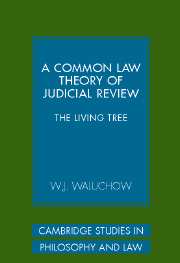5 - A Mixed Blessing
Published online by Cambridge University Press: 09 July 2009
Summary
A Fresh Start
The preceding chapter contains some of the strongest and most common objections to Charters one encounters in both public and academic discourse. The list is by no means exhaustive, and it no doubt fails fully to reflect the full spectrum of critical views. It does, however, provide what I believe to be a fair, representative picture of the kinds of objections on offer. In each instance there are immediate responses to be made, of course, some of which we have explored. Further responses exist in the vast literature dedicated to debates between Critics and Advocates. Of particular note are the many responses spawned by Waldron's penetrating critique of the Standard Case. But instead of pursuing these debates further, I wish to take a different tack. Instead of answering the Critics in the terms presupposed by their debates with the Advocates, I will instead focus on two of the agreed, basic premises upon which much of that debate has been based. Consider again the various objections outlined. In each case we can see that the criticism is premised on one or both of two critical assumptions: (1) there are “objective” truths, concerning, for example, political morality, what the framers intended, or the Charter's plain or original meaning, which an impartial, morally neutral judiciary is capable of discerning and drawing upon in making Charter decisions; and (2) Charters aspire to entrench the rights these truths describe or establish, as fixed points of agreement on and precommitment to moral limits on government power.
- Type
- Chapter
- Information
- A Common Law Theory of Judicial ReviewThe Living Tree, pp. 180 - 215Publisher: Cambridge University PressPrint publication year: 2006

